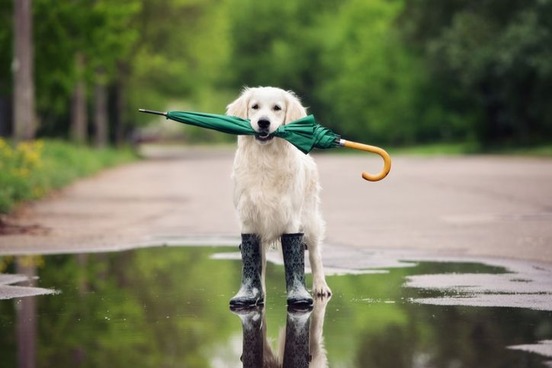
Rain cats and dogs
The expression "raining cats and dogs," indicating the occurrence of heavy rain and blowing winds, has been around since at least the 17th century. More than likely, the phrase does no more than implicitly compare the violence of a heavy rainstorm with that of a mighty cat-and-dog fight. However, no single explanation has been definitely established, and a few others have been advanced.
There are those who see significance in the fact that witches in Norse mythology rode upon storms in the shape of cats, while dogs and wolves were the attendants of Odin, father of Thor—the god of thunder, lightning, and storms. Others call upon obsolete catadupe, meaning "waterfall," which is derived from the Latin name for the first cataract of the Nile. A more literal, and rather unappealing, explanation holds that after a cloudburst in days of ole, gutters would rage with a filthy torrent that included dead dogs and cats. Maybe this is a mystery best left unsolved.
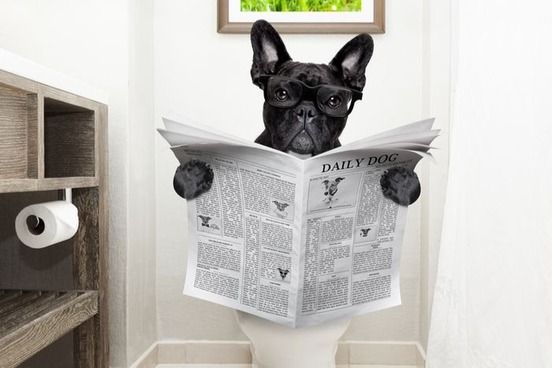
Bulldog edition
The term bulldog edition has been in print since the early 20th century and is used by newspaper editors to denote an early edition of a morning paper printed (and even sold) the day before its publication date.
Bull-dog editions … dated as of the next day and put on the street as soon as the afternoon papers' sale slowed down.
— The American Mercury, October 1926His assistant already had read the morning papers and the first editions of the afternoon papers, known as the "bulldog edition," which is really the morning papers rewritten, with just a new angle on the news. In a poker way, the "bulldog" goes the morning paper one better.
— Alex McD. Stoddart, The Independent, January-July 1912
No one knows for sure how the term originated. One entertaining theory relates it to the editors of competing New York papers that printed early editions and subsequently "fought like bulldogs" to outscoop each other. Others have suggested that bulldog refers to the attention-grabbing headlines of newspapers hitting the streets early that figuratively bite the reader like a bulldog—but these theories do not hold when you consider that bulldog also was journalese for "filler."
"Bulldog" is filler of current but not immediate news, differing from "grapevine" in that it still breathes, and differing from news in that it has lost its freshness after the catch.
— The Chicago Sunday-Tribune, 16 June 1918
Another theory is that the bold headlines of the editions "barked" for attention. Regardless of how it originated, the term bulldog edition became an established part of the jargon of journalism.
The low-slung canine itself has bowed front legs that are so far apart that the dog looks as if it were eternally looking for a fight. Indeed, its whole body has a sturdy, rock-solid appearance, and there was a time when the bulldog needed all the sturdiness it could muster. It also needed plenty of courage and determination, as well as something the breed is not characterized by today: ferocity. The bulldog gets its name not from the fact that it resembles a domestic bull but from its use in the cruel and savage sport of bullbaiting.
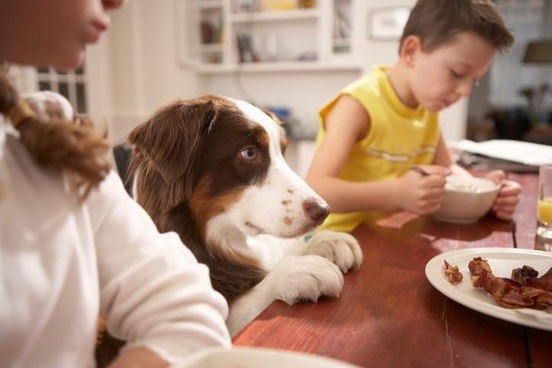
Dog's breakfast/dinner
Since the late 19th century, the expression dog's breakfast has been chiefly used in British slang for a distasteful, inedible mess or mixture, literally and figuratively.
The bill is a dog's breakfast of legal errors and technical impossibilities.
— Larry Downes, Forbes, 24 May 2018
A couple etymologies on the expression have been served up: it could be an allusion to a culinary effort that results in something that is only fit for the consumption of one's four-legged companion or the fact that dogs' meals in the past (before canned and packaged gourmet dog food) were a mess of leftover "people" food. But, honestly, the connection between a dog and breakfast isn't at all clear—nor is dinner, for that matter, which is the next course we serve—since a dog's breakfast is usually the same as its lunch and dinner.
The term dog's dinner fashionably arrives by the beginning of the 20th century. Like dog's breakfast, it refers to a figurative mess but additionally connotes that someone or something is a mess concerning their dress or appearance.
A survey a couple of years ago … revealed that ... Brits love a good project in the home, … with one in 10 of us actually injuring ourselves doing DIY, and there being on average more than 31 million unfinished jobs in British homes started by amateur improvers but never completed. What's more, we spend on average almost £250 getting an expert in to fix what we've made a dog's dinner of.
— David Barnett, The Independent, 15 July 2018
It's unclear how dog's dinner became associated with one's appearance. Another expression linking the two is "to put on the dog," meaning "to pretend that one is very stylish or rich"—but it's American and, as such, is unlikely to be cut from the same cloth.
We always had a Saturday night party when Aunt Lizzie came. That gave her a chance to visit those she had grown up with, and as Father said, to show off, and put on the dog, and generally to show how well she had done since she left Renfrew County.
— Mary Cook, The Smiths Falls Record News, 18 May 2018
Dog by itself, in reference to affected stylishness, nuzzled its way into American English in the second half of the 19th century. The following excerpt from the 1871 work Four Years at Yale offers confirmation: “Dog [means] style, splurge. To put on dog is to make a flashy display, to cut a swell."

Mutt
Meathead's heyday was in the 1970's with its somewhat regular appearance in the sitcom All in the Family, in which the character Archie Bunker was known for using it to address his hapless son-in-law. The Archie Bunkers of an earlier time in America expressed a similar sentiment with the word muttonhead, which goes back to the early 1800s and is believed to have influenced the formation of meathead. By the 20th century, muttonhead was clipped to mutt and used as a generalized term of derision for two-legged as well as four-legged animals, especially a mongrel dog.
Mutton itself traces back to mutun, the Anglo-French name for the ram or sheep. The French also applied the word to the animals' flesh used for food. Borrowed into Middle English as motoun with these senses, the word eventually came to be spelled mutton.
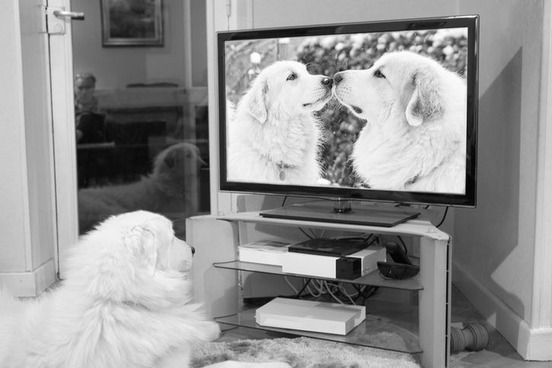
Mondo
Those at one with Zen Buddhism will know mondo as an instructional technique consisting of a rapid questioning between master and pupil with the intent of pushing the pupil's limitations of conceptual thought. For example:
Pupil: "How can one become free?"
Master: "Who has imprisoned you?"
The predecessor of that mondo is Japanese mondō.
Another context in which you might encounter mondo is in the title of a franchise of bizarre and gruesome (and offensive) films.
The first "Mondo" film was the 1962 Italian shocker Mondo cane, which translates as "Dog's World." It features explicit vignettes depicting bizarre human behavior. The bizarreness of the scenes likely inspired the title of its 1966 sequel, Mondo Bizarro—also, iconic punk band the Ramones used the sequel's name for its 1992 album.
But we digress. The conception of the title Mondo cane is inspired by the film's opening scene in which a dog is dragged into a kennel against its will as the dogs around it bark furiously.
The Mondo films quickly developed a cult following and their provocative scenes caused a stir. It didn't take long before mondo was generalized as a mainstream adjectival and adverbial intensifier for things that were extreme in some way. Teenage Mutant Ninja Turtle Michelangelo was fond of the word, using it as an adjective in expressions like "mondo disaster" and "mondo notion" and as an adverb in "mondo confused."
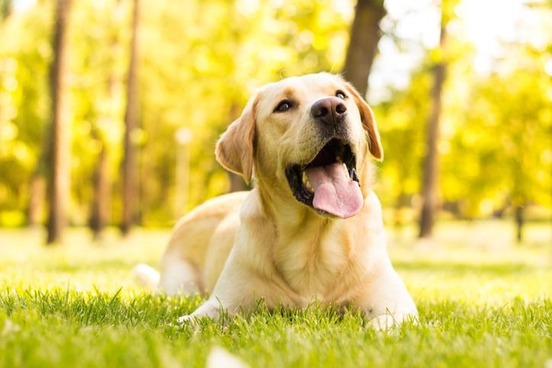
Yellow/Blue dog
In the 19th century, the noun yellow dog developed a derogatory sense, meaning a low, despicable person. This usage probably came about from the traditional association of the color yellow with cowardice. Just before the turn of the century, the adjective yellow-dog started to be used by writers who were derogatorily describing organizations that expressed opposition to trade unions. The popularized term "yellow-dog contract" refers to an agreement in which the employee agrees not to join a labor union during the time he or she is employed. You may also encounter a use of yellow-dog that is not connected to the anti-union sense. A "yellow dog Democrat" is one who strictly votes the party line. It is said that such a person would rather vote for a yellow dog than for a Republican.
In the 1990s, another hued Democratic dog was introduced into U.S. politics: the Blue Dog. The Blue Dog is a member of a group of primarily southern Democrats who identify themselves as more moderate and conservative than mainstream members of the party. Their name may have been inspired by the blue dog depicted in paintings by Louisiana artist George Rodrigue, which hung in the offices of Louisiana congressmen who helped form the Blue Dog coalition.

Snack
You might hear of a dog "snapping" or "taking a snap at (something)," meaning it makes a sudden biting motion towards an object. That use of snap goes back to the 1500s. Earlier, about 1400, people would say a dog "snaked" or "took a snake"—those are the Middle English forms of the familiar modern verb and noun snack, which are believed to be derived from the Middle Dutch verb snacken, also meaning "to bite."
Apparently, when an animal "snacked," it sometimes took a portion of something, leading to senses of both the verb and noun denoting a share, portion, or part, which were established in English by the early 1700s. At that time, the noun snack was also used for a small drink of liquor.
And take his snack of brandy for digestion.
— Charles Kingsley, The Saint's Tragedy, 1848
The now-common "food" sense of snack, referring to a light meal or food eaten between meals, soon followed but early use often referred to what is known today as "lunch."
I didn't eat nothing but a bit of a snack at noon, and I am hungry.
— Amelia Beauclerc, Ora & Juliet, 1811
The corresponding verb sense, referring to the consumption of a small amount of food eaten between meals, was served up in the early 1800s, but it wasn't until the mid-20th century that people were "snacking on snacks."

Dogwood
The dogwood is known to beautify a landscape with its flowers in the spring and berries in the fall, and, for many, its phases signal the arrival of spring and the coming of winter. A popular theory as to the origin of its name is planted in Middle English dag, a word that generally refers to a pointed object and that is derived from French dague ("dagger"). That etymology is rooted in the tree's characteristic hardwood and strong slender stems which, through the ages, have been used in making strong piercing tools, such as skewers, arrows, and spindles. It has been suggested that dog is a corruption of dag, but etymological evidence of that change is soft. On another note, we're confident that dagwood is the name for a many-layered sandwich made popular by the character Dagwood Bumstead in the comic strip Blondie.
Considering that the tree had the previous names of dog tree, dogberry, hound's-tree, and hound's-berry, it's more than probable that the source of dogwood is dog; it fits the nomenclature. These names may have come about from use of the tree's bark as a wash for a mangy dog—or because the tree's branches "bark" when rubbed together in the wind.

Caterpillar
On looking at a fuzzy caterpillar you might see a resemblance to another animal. One kind of caterpillar must have reminded some people of a bear and was at one time called a bear worm—later, a woolly bear. In France long ago, the fuzzy caterpillars probably made some people think of little dogs. The French word for the caterpillar is chenille, which comes from the Latin word for "little dog," canicula; chenille also refers to a soft fabric with protruding piles.
English caterpillar comes from an early French dialect word, catepelose, which is made up of two words meaning "hairy cat." Pelose, meaning "hairy," was taken from Latin pilus, "hair." That Latin word is the same root as the modern English word pile, meaning "a coat or surface of short furry hairs." Since many caterpillars are covered with such a coat, the name is very fitting.

Canary
The name "Canary Islands" comes from Latin Canariae insulae, meaning "dog islands." According to what Roman scholar Pliny the Elder found in the writings of Juba II, the king of Numidia and Mauretania who lived from circa 50 B.C. to circa A.D. 24, the group of islands that Juba explored off the northwest coast of Africa were remarkable especially for the multitude of large dogs that inhabited them. The Latin word for "dog" being canis, the islands were named Canariae insulae.
Neither Juba nor Pliny probably knew it, but the dogs on the islands were most likely brought by earlier invaders from Africa and were not indigenous. A kind of small greenish-brown bird was, however, native to the islands. Some of these birds were brought to Europe in the 16th century and were called "Canary birds" by the people of England. The name of the birds was shortened to "Canary" over time, as the birds were bred to be the greenish to yellow birds that we know today. The dogs for which the islands were named have been forgotten while the birds still remain closely linked to their namesake.

Canine
The adoption of canine into English is a bit uncanny. The word is a derivative of the Latin adjective caninus, based on canis, meaning "dog." However, it was first applied in Middle English (circa 1400) as a noun and adjective in reference to one of the four pointed teeth situated on each jaw in mammals ("the canine teeth")—the upper canines in the human jaw are called eyeteeth, the lower are stomach teeth. The "dog" senses are actually recorded centuries later: in the early 17th century, the adjective begins to be barked ("canine devotion") and then the noun ("a well-behaved canine")—but not until mid-19th century.

Bench
Some might know (the relatively new sense of) benching as the annoying act of stringing along someone who you are somewhat romantically interested in by occasionally sending them a text, tweet, or snap—but not following up the response. Effectively, the bencher keeps the person as an available option—much like a coach who has the option to play second-string players seated on the bench during a game.
In the past, benching referred to seating someone on a bench of justice or honor. In the late 19th century, dogs were so seated in "bench shows"—that is, shows in which dogs are exhibited on benches.
You are to be congratulated … for the very fair, impartial and complete critique of the different breeds of dogs benched at the last New York show.
— The Fanciers' Journal, letter, 19 Mar. 1892
According to known print evidence, this use of the verb seems to precede the verb's sports senses referring to the removal of a player from a game or keeping a player on the bench during one, which are attested more toward the end of the century.
It's in the first half of the 20th century that people begin using bench in direct reference to the reserve players on a team seated on the sideline bench, as in "the team has a deep bench." The act of leaving the bench to brawl with the other team was given the name bench-clearing soon after. Benchwarming (the instance of remaining seated on a bench as a substitute for an entire game), on the other hand, has been sitting around since the 1880s—close to the time of "benching" dogs.

Hangdog
First off, this one gets dark.
In the past, dogs that misbehaved in a violent or condemnable manner—such as biting a human or stealing a person's food—were often terminated by hanging. William Shakespeare brings this unfortunate social practice to light in his comedy Two Gentleman of Verona through Launce, a comical servant and owner of the canine Crab. In the play, Launce explains how, when Crab is caught relieving himself under a banquet table, “all the chamber smelt him. 'Out with the dog!' says one; 'What cur is that?' says another; 'Whip him out' says the third; 'Hang him up' says the Duke.
Post-Shakespeare, hangdog came to be used as both an adjective describing either the expression of dejection, guilt, or shame that resembled the look on the condemned dog's face or that of the degraded executioner's; hangdog is also a noun referring to a person so degraded that he could hang a dog.

Bone to pick
The phrase "a bone to pick" goes back to at least the 16th century. Originally, "to have a bone to pick" (or "to have a bone to gnaw") meant "to have something to keep one occupied," and evolved to mean "to have a problem or difficulty to solve." Thus, if someone has a bone to pick, they have something that would occupy their attention in the same way that a dog will stay occupied when it has a bone to pick at or gnaw on.
It is the sense relating to having a problem or difficulty to solve that the phrase "to have a bone to pick with someone" employs. If you have a bone to pick with someone, you have a problem (a disagreement or complaint) that the two of you need to work out, something that, figuratively speaking, you would need to pick at as a dog picks at a bone.
The phrase "to make no bones about it," meaning "to be straightforward, unhesitating, or sure about something," goes back to the Middle Ages and either originated in the kitchen or the gambling house.
QUIZ TIME: Name that Dog Breed





